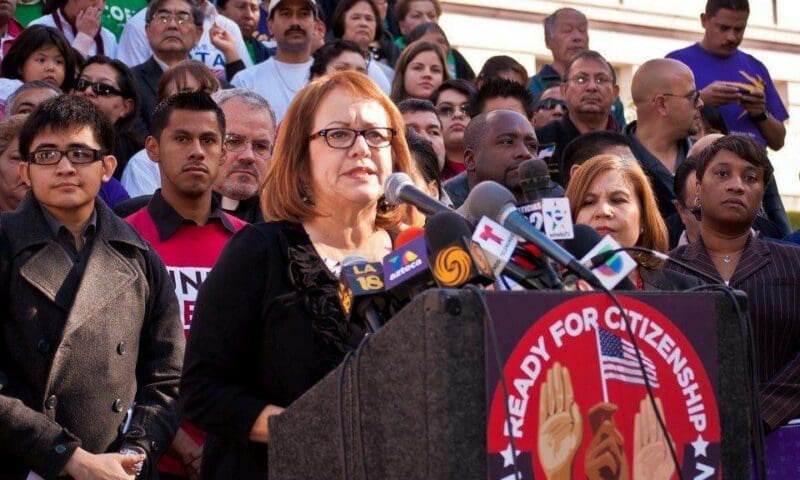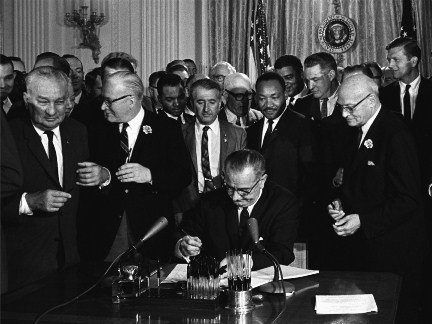LATEST NEWS


On November 6, 2012, the people sent a message: Americans cannot be bought. We do believe there is a place for government in providing services that the private sector is ill-equipped to provide.
We have experienced a change in attitude across the country, demonstrated by many of the Tea Party politicians losing their seats and more progressive Democrats winning seats. But we need to stay vigilant. The end of the year did not bring major tax increases for working people and spending cuts, but everything could change in the coming months. The fight hasn’t ended.
I don’t mind the Bush tax cuts expiring for everyone if that is what it takes for the richest One Percent to start contributing more to our economy. But I strongly disagree with the cutting of essential benefits, especially Social Security, Medicare and Medi-Cal. I also reject the notion that there must be a “balanced approach”


Christian Torres worked as a cook in the Pomona College dining hall for more than six years. Torres and 16 of his co-workers were fired from Pomona College for not re-verifying their work eligibility after the college asked for documents, which were requested while he was leading an effort to organize to form a union. Torres and his brother came to the United States while still teenagers to join their mother and father who were already in the U.S. He supports the movement to create a common-sense immigration process. Although Torres was fired from Pomona, he continues to support his co-workers in their struggle for better working conditions at the college.
Torres, along with a diverse coalition of families, immigrant rights, labor, faith, business, students and elected leaders, sent a clear message last Friday about California’s leadership role in making immigration reform with a path to citizenship possible.
“There are more opportunities to build a stable future in this country,”
» Read more about: California Coalition Calls for Immigration Reform »


In the present (increasingly precarious) workforce more young people with expensive humanities degrees are being forced to utter a phrase that couldn’t be further from the high language of the academy: “May I take your order?” In an awesome new piece in The Nation, Nona Willis Aronowitz draws an important distinction between workers who are forced to take low-paying jobs despite their education and those who are making ends meet the only way they know how.
Aronowitz uses the protagonists from several popular new shows to indicate larger workplace trends. From The Nation:
Post-recession, we often blur the distinction between the downwardly mobile and the permanent underclass—especially when wringing our hands over what will become of millennials, many of whom entered the job market just as it was weakest. Here’s an easy way to tell them apart: both are struggling, but the former has a safety net.
» Read more about: Channeling Poverty: Poor v. Broke on TV »


In an action that already feels like ancient history, Congress voted earlier this month to avoid the “fiscal cliff.” While much remains to be settled, the revenue side of the issue got resolved because 84 House Republicans joined 172 Democrats to support the solution negotiated between the President and the Senate. In some ways, such bipartisanship was a moment of déjà vu from a time, nearly 50 years ago, when two pivotal civil rights bills were being considered. Then, Lyndon Johnson was President and both houses of Congress were in the hands of Democrats. Martin Luther King was in the streets. The Student Nonviolent Coordinating Committee was registering voters. The 1964 Civil Rights Act and the 1965 Voting Rights Act were passed by Republicans joining Democrats to move the President’s legislation into law.
In both circumstances – today, as then – it was one party’s Southern flank that refused to go along with its leadership.
» Read more about: Great Migrations: Our Civil Rights Laws and Their Legacy »


President Obama’s inspiring inaugural address thrust a challenge upon every American: We must work to build a nation which “thrives when every person can find independence and pride in their work;” an America where “the wages of honest labor liberate families from the brink of hardship.”
Confronted by a Republican House and cautious centrist Democrats, the President can only seek progressive economic reform if the 99 Percent organize to demand it.
Fortunately, there’s no shortage of ideas around which we can organize. Here are five practical proposals for redirecting the U.S. economy toward justice, crafted by some of our wisest economic experts.
1) Increase the federal minimum wage to $9.80 per hour, as proposed by Senator Tom Harkin and Rep. George Miller. This one simple step will improve the lives of 29 million workers. Contrary to claims by the fast food chains and other low wage employers,
» Read more about: Achieving Obama’s Economic Goals: Five Steps to Take »


Each year, some 2,000 yoga enthusiasts assemble at the Hyatt Regency Hotel in San Francisco, California for “a great convergence of yogis of all ages and backgrounds,” states convention sponsor Yoga Journal. The extremely liberal and tolerant “City by the Bay” seems the perfect spot to spiritually and intellectually delve into yoga principles of social service and physical purification.
“But there is one huge problem,” according to 19-year veteran yoga instructor Sri Louise. “There is a huge disconnect with our ethical values by scheduling a convention at a union boycotted hotel that has a lousy safety record and mistreats it employees.”
A January 17 late afternoon picket by around 150 UNITE-HERE Local 2 supporters made this point loud and clear.
UNITE-HERE Local 2 union representative Julia Wong told me:
“This has been an active boycott with regular picketing for three years and Yoga Journal has not taken us seriously.
» Read more about: Bad Karma at San Francisco’s Hyatt Regency »


Forty-five years after his death, Martin Luther King’s vision of racial and economic progress continues to exert a powerful influence on our society. In this video, Marilyn, a young African-American electrician apprentice, reflects on MLK’s legacy and how construction work and access to a good career has radically improved her life. Construction gives Marilyn not only socioeconomic mobility, but also an intellectual and physical challenge.
“From the Ground Up” is a series of videos profiling diverse individuals within the construction trades, ranging from veterans to women to former convicts to youth of different incomes and ethnicities.
Happy Martin Luther King Jr. Day to all! Please enjoy the video and share it with friends.
» Read more about: Dr. King’s Economic Legacy: Jobs and Justice »


Today Rev. Martin Luther King Jr. is viewed as something of an American saint. His birthday is a national holiday. His name adorns schools and street signs. Americans from across the political spectrum invoke King’s name to justify their beliefs and actions, as President Barack Obama will no doubt do in his second Inaugural speech and as gun fanatic Larry Ward recently did in outrageously claiming that King would have opposed proposals to restrict access to guns.
So it is easy to forget that in his day, in his own country, King was considered a dangerous troublemaker. He was harassed by the FBI and vilified in the media.
In fact, King was radical. He believed that America needed a “radical redistribution of economic and political power.” He challenged America’s class system and its racial caste system. He was a strong ally of the nation’s labor union movement. He was assassinated in April 1968 in Memphis,
» Read more about: Martin Luther King Jr., Eternal Radical »




Last week’s purchase of the SF Weekly by the owners of the SF Examiner and Bay Guardian was a shocking and telling development. It was shocking because few seemed to care, and telling because it showed the increasingly irrelevance of daily print English language media in San Francisco. I described in 2009 why the San Francisco Chronicle’s huge financial losses and circulation decline put its future as a daily print newspaper in doubt, and these losses have continued while the paper has fallen out of the top 25 in circulation for the first time (its print version had only 165,000 readers in March 2012, a nearly 50 percent drop since 2009). The Chronicle’s owner is looking to profit from real estate development, not journalism. Layoffs at the SF Weekly have begun and the staffs of the once combative weeklies will eventually merge.
» Read more about: Economy and Technology Pound Bay Area Newspapers »


The Line, whose trailer appears here, is Emmy Award-winning producer Linda Midgett’s 44-minute documentary about the many faces of poverty in America. The film examines and explodes prevailing myths about people living below the poverty line, reminding us that most of America’s poor live in its suburbs and not the inner city. To learn more about The Line or to view the entire film, go to this link.


(The following post first appeared on Unionosity and is republished with permission.)
A group of 200 CEOs known as the Business Roundtable made some unsurprising recommendations for debt reduction [Wednesday], suggesting cutting entitlement programs and pushing the age of eligibility for Medicare and Social Security to 70. The recommendations, which the group plans to make to both Congress and the President, also resist any increased Social Security taxation on wealthy Americans.
[Reuters] reports:
The group would push the age at which full Social Security benefits are paid to 70 for those now aged 54 and under. Currently, the age for collecting full benefits depends on year of birth. Someone born between 1946 and 1953 can take full benefits at age 66. That will rise to age 67 for individuals born in 1960 or after.
The group is explicit in its goals to use the debt ceiling debate as an impetus to push radical policy initiatives.


What would it cost if the nation’s crumbling infrastructure of bridges, roads, rails, sewer systems, power grids, airports and more is allowed to deteriorate at its current pace? Some 3.5 million jobs and $3.1 trillion in lost economic output by 2020. What would it cost to avoid that? About $1.1 trillion in additional investment.
Sure sounds a like a great return on the investment and it is, according to a new report from the American Society of Civil Engineers (ASCE). The study, Failure to Act: The Impact of Infrastructure Investment on America’s Economic Growth, finds that:
Deteriorating infrastructure, long known to be a public safety issue, has a cascading impact on the nation’s economy, negatively affecting business productivity, gross domestic product, employment, personal income and international competitiveness.
ASCE finds that with an additional investment of $157 billion a year between now and 2020,
» Read more about: Our Crumbling Infrastructure: The Cost of Doing Nothing »


This week the Los Angeles Times reported that L.A. attracted a record number of tourists in 2012. More than 41.4 million out-of-town visitors came to our city for business, pleasure and everything in between – that’s about a million more visitors than in 2011. According to the Times piece, L.A.’s hotel occupancy rate in 2012 broke its pre-recession record, reaching 75.4 percent (the previous high was 75.1 percent in 2006).
Economic turnaround for tourism could be very good news for our city as a whole, because tourism is big business in Los Angeles – really big. Every year, tourism pumps more than $15 billion into our local economy. The tens of millions of business travelers, convention-goers and international and domestic visitors who come to Los Angeles make hospitality a primary economic engine for our city. It’s a simple formula: When visitors come to Los Angeles they spend their money in Los Angeles.
» Read more about: Will L.A.’s Tourism Boom Be a Bust for Workers & Economy? »


The headline to Daniel Borenstein’s recent Contra Costa Times column didn’t leave much to the imagination: “CalPERS planning to gut a key cost-control provision of new pension law.” Pairing CalPERS – the nation’s largest public employee retirement fund – with pension-reform sabotage promised red meat for conservatives who share the columnist’s disdain for unions. Borenstein didn’t let them down.
“By administrative fiat,” he wrote, “the California Public Employees’ Retirement System has undermined a key anti-spiking provision of the new state pension law that Gov. Jerry Brown signed last summer.” Not true, responded CalPERS, which claims Borenstein’s political biases led him to completely misrepresent its actions.
After sounding the alarm, Borenstein accused the government-run CalPERS of attempting to “fatten” pensions for new public employees while “eroding” the billions in tax dollar savings that the new law, crafted by Brown, was intended to create.


A few California local governments last week took a crucial step, almost unnoticed, to demand that banks pay back tens of millions of dollars which they allegedly conspired to take from the taxpayers. The City of Riverside, San Diego County, San Mateo County and five other government bodies sued almost two dozen multinational banks over the harm they allegedly caused taxpayers in the global “LIBOR” [London Interbank Offered Rate] scandal.
Notably absent from this initiative, however, are our California’s largest local governments: L.A. City and L.A. County. Equally notable is the failure of the news media, apart from specialized, business-oriented news services and blogs, to pay attention to what could be a major game changer in the 99%’s fight to make banks pay for crashing our economy.
Why should we care about something as obscure as the LIBOR financial index?
Because it set the interest rates for trillions of dollars in loans across all sectors of the global economy – ranging from your auto or home equity loan to multi-billion dollar government and corporate borrowings.
» Read more about: SoCal Governments Target Swap-Tainted Banks »


Readers of Monday’s New York Times may be forgiven for thinking an article by James Dao was about a new insult to America’s military veterans. After all, Dao reported that soon all vets separated from active duty within the past year, without dishonorable discharges, might be facing an even harsher existence than military life – as Walmart employees. Study after study has shown the retail behemoth to be a cutthroat employer of last resort, most of whose business innovations seem to involve new ways to save the corporation money by slashing employee hours and benefits.
Somehow, though, that didn’t figure much into the Times story. Instead, we read about a patriotic company with plans to hire 100,000 service men and women – essentially any American vet who needs a job. The recruitment begins Memorial Day, no less. According to the Times:
“Gary Profit,
» Read more about: Vets to Enter Walmart’s Supply Chain of Command »


Source: Warehouse Workers United
» Read more about: Walmart Cambodian Supplier Shuts Plant, Stiffs Workers »